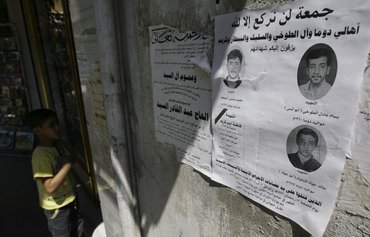PARIS -- European Union (EU) foreign ministers on Wednesday (March 31) said they would demand "accountability" from the Syrian regime as well as extremist and other armed groups over alleged war crimes committed since the conflict began.
"Our countries are committed to ensuring that war criminals and torturers will not go unpunished," the 18 ministers said in a joint statement published on the website of the French Foreign Ministry.
"We will not remain silent in the face of the atrocities that have taken place in Syria, for which the regime and its external supporters bear the main responsibility," the ministers said.
"It is everyone's responsibility to fight impunity and demand accountability for the crimes committed in Syria regardless of the perpetrator."
![A Syrian boy holds an oxygen mask over the face of an infant at a make-shift hospital following a reported Syrian regime gas attack on the opposition-held town of Douma in Eastern Ghouta on January 22, 2018. [Hasan Mohamed/AFP]](/cnmi_am/images/2021/04/01/29196-Syria-chemical-attack-600_384.jpg)
A Syrian boy holds an oxygen mask over the face of an infant at a make-shift hospital following a reported Syrian regime gas attack on the opposition-held town of Douma in Eastern Ghouta on January 22, 2018. [Hasan Mohamed/AFP]
In the past 10 years almost 400,000 people have been killed and more than six million have been forced to flee the country to escape "countless violations of human rights", the ministers said.
Syrian President Bashar al-Assad, who is backed by Russia, also has been accused of using chemical weapons in breach of international law as he fought to regain control of the country.
"Full light must be shed on this decade of atrocities," the ministers said.
"We continue to call for the International Criminal Court to be allowed to investigate crimes alleged to be committed in Syria and prosecute the perpetrators."
Cases already have been filed in several European countries on the principle of universal jurisdiction, which allows suspects to be tried outside the territory of where the crimes were committed.
A German court in February convicted a former Syrian intelligence service agent for complicity in crimes against humanity, in the first court case worldwide over state-sponsored torture by the Syrian regime.
The statement comes after international donors on Tuesday pledged $6.4 billion in aid for Syria and the thousands of refugees in neighbouring countries, falling far short of the $10 billion target urged by the United Nations.
The need for aid has increased on the back of the coronavirus pandemic and a slump in the value of the Syrian pound, which has sent food prices soaring.
Efforts have stalled to find a lasting peace deal to end a conflict that has pitched world powers against each other and fuelled the rise of the "Islamic State of Iraq and Syria" (ISIS).
Reconstruction aid on hold
European countries insist they will not spend money on a broader rebuilding in Syria until al-Assad commits to a genuine political process to resolve the conflict.
"The European Union has adopted targeted sanctions against individuals and entities close to the regime that are behind the repression of the Syrian people," the ministers said in their statement.
"We reject the regime's narrative that these sanctions are to blame for the suffering of the Syrian people. It is the regime's blatant neglect and mismanagement of the economy which has led to the current economic crisis facing Syrians."
The US government passed the Caesar Syrian Civilian Protection Act of 2019 to hold al-Assad accountable for the Syrian regime's crimes.
The legislation penalises companies worldwide that deal with the regime and blocks US reconstruction aid until perpetrators of abuses in Syria's war are brought to justice.
It is also designed to block interference from Russia and Iran and prevent them from profiting through lucrative reconstruction contracts from the oppression of the Syrian people.
Since the Caesar Act came into effect in June, the United States has issued a raft of sanctions against figures close to the regime.

![Joint plaintiffs are seen at the courtroom prior to the start of a trial against two Syrian defendants accused of state-sponsored torture in Syria on April 23 in Koblenz, Germany. Two alleged former Syrian intelligence officers were accused of crimes against humanity in the first court case worldwide over state-sponsored torture by the Syrian regime. [Thomas Lohnes/POOL/AFP]](/cnmi_am/images/2021/04/01/29197-Germany-torture-trial-600_384.jpg)






